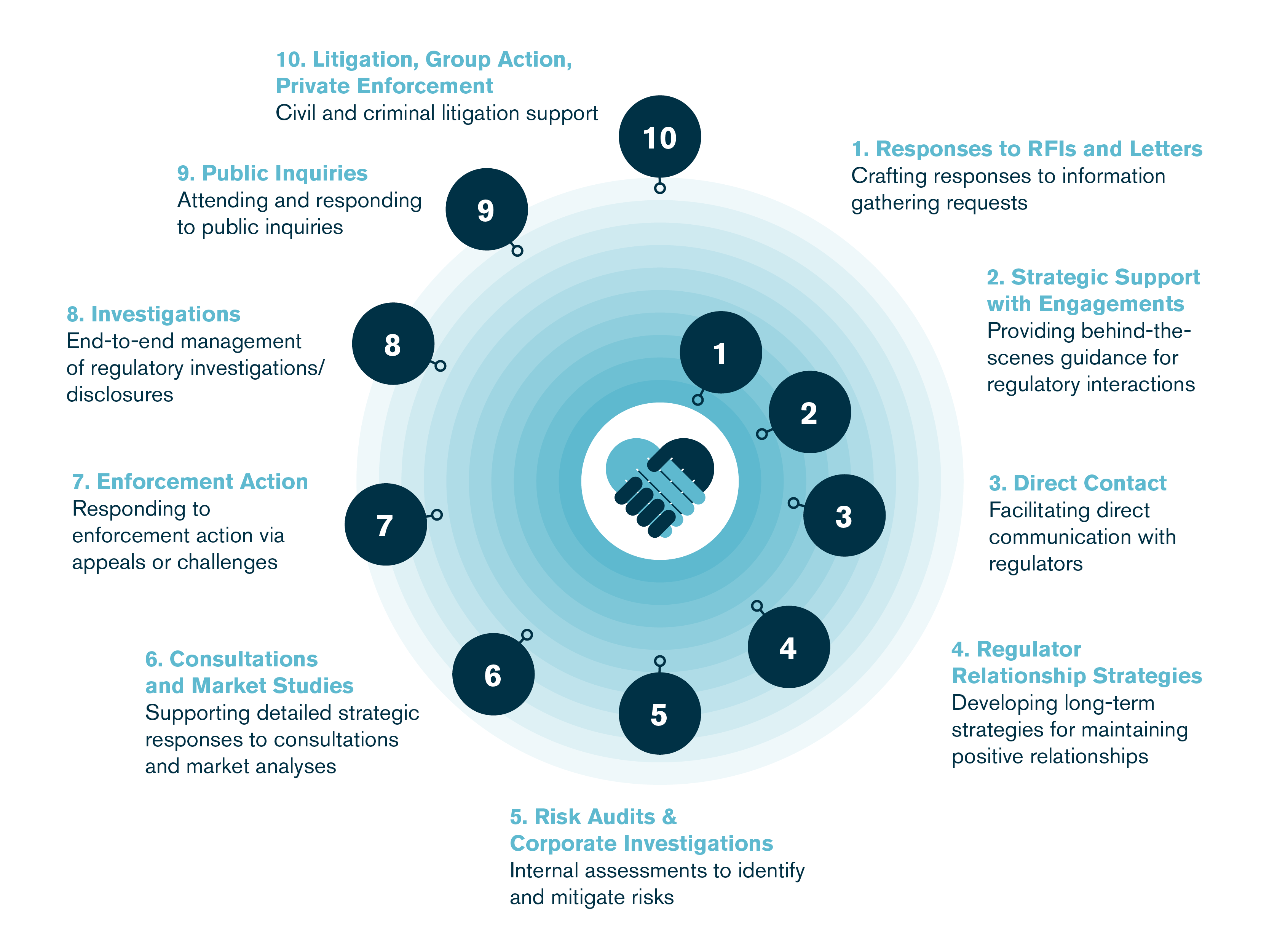Introduction
The Digital Markets Competition and Consumers Act (DMCCA) introduces fundamental changes to UK competition and consumer regulation, as well as a brand-new digital markets regime to regulate the largest tech companies and a cross-sector regime for business-to-consumer subscription providers, from streaming to gym memberships.
The DMCCA also establishes a new unit within the CMA – the Digital Markets Unit (DMU) – to oversee the new digital markets regime and increases the scope and strength of the CMA's consumer and competition enforcement powers.
The digital market and competition aspects of the DMCCA came into force on 1 January 2025 and the consumer aspects apply from 6 April 2025. The new subscriptions regime is expected to follow in spring 2026.
What you need to know
- Digital Markets
DMU fully launches
The DMCCA establishes a new unit within the CMA – the Digital Markets Unit (DMU) – to oversee the new regime. While it has been operating in shadow form since April 2021, the DMU will be placed on statutory footing by the DMCCA and will be fully operational from 1 January 2025.
'Strategic market status' designation
The new regime will regulate the most powerful participants in the UK digital market. Only a handful of these companies will be subject to the new digital regulation powers of the CMA – those with so-called strategic market status (SMS) that have substantial and entrenched market powers, as well as a position of strategic significance in respect of a digital activity.
DMU has extensive powers
The new regime will give the DMU extensive powers, including the introduction of binding codes of conduct on the SMS firms and to carry out PCIs. The DMCCA will introduce new codes of conduct for SMS firms, setting out conduct requirements for them SMS to follow, these requirements must follow the objective of either fair dealing, open choices or trust and transparency. Examples of the types of conduct requirement that may be imposed include a requirement to trade on fair and reasonable terms and a requirement that technology interoperates with third parties.
DMA similarities and differences
The digital markets regime under the DMCCA will be similar but not the same as the EU's new digital markets regime. The new regime will pursue similar aims and operates in a similar way to the EU's new digital regulation rules under the Digital Markets Act (DMA) which regulates "gatekeepers" – these are broadly expected to align with SMS firms under the UK's regime.
New rules have broad market relevance
The new digital rules are not just relevant to the players regulated under the DMCCA. While the digital rules may only apply to the handful of firms designated as SMS, given the broad reach of the firms with this designated status, the rules have the capability of affecting any company that has dealings with the regulated firms.
- Competition
Merger controls changes
The DMCCA increases the merger-control turnover threshold £70 million to £100 million. It also creates a new "safe harbour" for mergers where each party's UK turnover is less than £10 million. These new thresholds will be active from the 1 January 2025. However the SMS merger control's mandatory filing requirement will only apply once a firm is designated as having SMS.
CMA's extra-territorial reach
The DMCCA expands the prohibition on agreements that restrict, distort or prevent competition and trade within the UK. Under the new regime, agreements do not need to be implemented in the UK and the prohibition will apply where there are (or are likely to be) immediate, substantial and foreseeable effects within the UK, potentially capturing a wider range of commercial agreements and activities.
Enforcement powers increased
The DMCCA increases the CMA's dawn raid powers for domestic premises. This modernises the powers to reflect the increase in employees working from home. Under the DMCCA, the CMA is granted powers to remove laptops and other personal devices from domestic premises to examine them off-site. The CMA's interview powers will also be increased. This will enable the regulator to compel interviews from any person even when they are not connected to a business under investigation. It also includes a general duty to preserve documents and evidence where a party knows or suspects that an investigation is likely to be carried out.
Standard of appeal changes
A reduced standard of appeal against interim measure decisions has also been introduced. The DMCCAchanges the standard of appeal from a full merits assessment to the judicial review standard. This is intended to increase the efficiency of appeals, as the Competition Appeal Tribunal will only be required to assess an appeal on grounds of illegality, unreasonableness, or irrationality.
New civil penalties
A number of new civil penalties have been introduced, where previously only criminal penalties applied, to strengthen the CMA's enforcement powers. This includes specific penalties for companies that obstruct investigations or destroy evidence, such as fixed penalties of up to 1% of global turnover, with additional daily penalties of up to 5% of daily turnover for continuing non-compliance.
- Consumers
Protection from unfair trading
The DMCCA revoked and replaced the UK's previous unfair commercial practices regime, introducing expanded and new prohibitions.
New regime for reviews and review information
A major change is the creation of a range of new prohibited practices (which attract civil remedies only) targeting fake and misleading consumer reviews and review information (each defined very broadly). This includes publishing consumer reviews and consumer review information without taking "reasonable and proportionate steps" to perform checks to confirm the reviews and review information are not fake or misleading and to remove these reviews or information from publication. The CMA's guidance is that publishers of consumer reviews should carry out initial and regular comprehensive risk assessments to identify and apply proactive reasonable and proportionate steps to prevent and remove banned reviews.
Blacklisted practices
There is also potential for new 'blacklist' prohibitions. The DMCCA makes it easier for the government to add new prohibited practices to the UK's unfair commercial practices regime (that is, conduct that is always prohibited, irrespective of the outcome for consumers).
Obligatory 'material' information
Beyond reviews and new blacklisted practices, the changes to the UK's unfair commercial practices regime include a requirement for traders to include "material" information when there is an "invitation to purchase" in order to avoid misleading consumers by omission. In effect, all consumer-facing materials that describe a product and contain a price will need to contain a list of mandated material information, including postal address and email address. There are specific presentation requirements traders must meet to demonstrate compliance and limited exceptions.
Prohibition of "drip pricing"
Specific requirements apply to the display of pricing information – traders must tell consumers in any invitation to purchase the total price of a product, which includes any mandatory fees the consumer will incur. This express prohibition is intended to address so-called "drip pricing" – where mandatory fees are "dripped" through the consumer journey.
Subscriptions
The DMCCA introduces a new regime for paid business-to-consumer subscription contracts. Once that regime comes into effect (anticipated no earlier than spring 2026) traders will need to meet strict requirements in respect of paid subscription contracts.
Pre-contract information
There will be a requirement for traders to add a new, standalone disclosure within a purchase journey that includes mandatory, subscription-specific "key pre-contract information" (in addition to a requirement to disclose the broader category of "full pre-contract information). Strict presentation requirements apply to this disclosure.
Renewal reminders
Throughout the lifetime of a subscription, traders will be required to remind consumers about upcoming subscription renewals. Specific information must be included in these notices.
Cancellation
Traders will need to ensure that arrangements for consumers to bring a subscription to an end are straightforward and do not necessitate steps that are not reasonably necessary. Consumers will also have the right to bring a subscription contract to an end by notice given by a "clear statement". New "end of contract" notice requirements will kick-in on cancellation.
Cooling-off rights
Consumers will benefit from additional statutory "cooling-off rights" in respect of subscription contract structures that include a free trial or lower-cost promotional period, and on renewal of an annual subscription. The implementation of the new regime will be governed by regulations and guidance that are yet to be finalised.
Enforcement
CMA gets 'sharper teeth'
The CMA will have "sharper teeth" to enforce consumer law. The DMCCA creates a new "dual" enforcement regime. The courts will continue to have powers to issue a range of orders, including online interface orders. In addition, the CMA will now have broad and discretionary investigatory and enforcement powers for infringement of a range of existing consumer protection and e-commerce laws, as well as the new subscription contract regime.
Central to the new regime is the duty of expedition imposed by the DMCCA on the CMA itself to take action / make decisions as soon as reasonably practicable. We expect this to dramatically impact the timetables of engagements with the CMA, and the pressure on the CMA will no doubt flow down to the businesses subject to attention.
Importantly, the CMA's new powers enable it to make a determination of whether certain elements of consumer law have been breached independently and apply enforcement measures, without taking a business to court. Direct enforcement can be brought to address:
- breaches of consumer protection provisions listed in DMCCA Schedule 16;
- breaches of undertakings and direct enforcement directions; or
- false or misleading information given to the CMA, and other non-compliance with information notices.
The CMA is keen to exercise these new powers, and statements have been clear that it will be focussing on egregious practices which have the potential to cause serious harm to consumers or increase pressure on household budgets. Examples given include:
- Aggressive sales practices related to vulnerable consumers;
- Misleading consumers with objectively false information; and
- Clearly unfair or imbalanced consumer contracts.
Within these priorities, the CMA has specifically called out "drip pricing" and fake reviews as areas for specific scrutiny, and have promised industry engagement and guidance to support compliance.
- How we can help
Click the image to view larger image



















